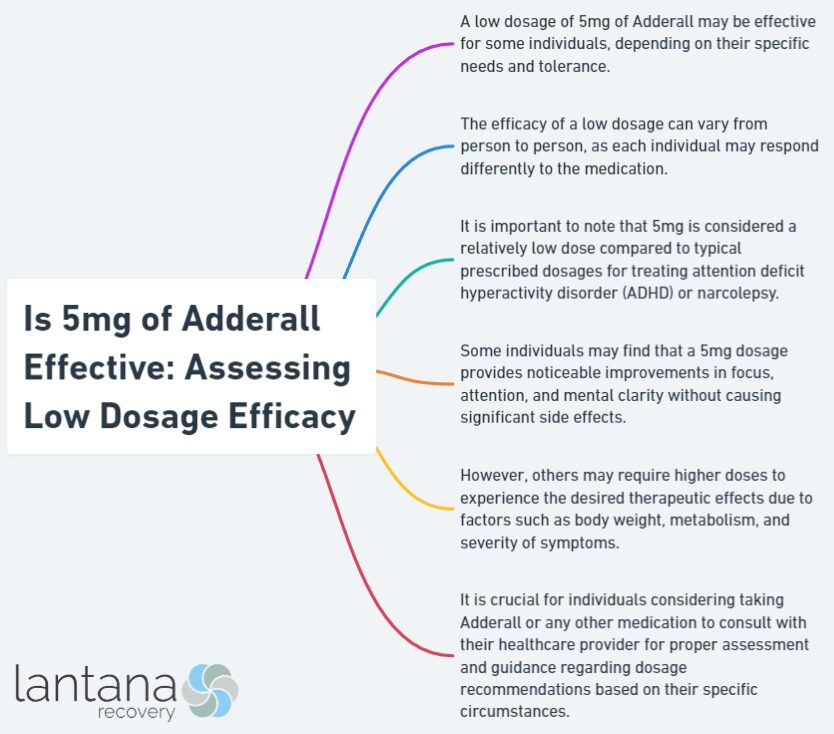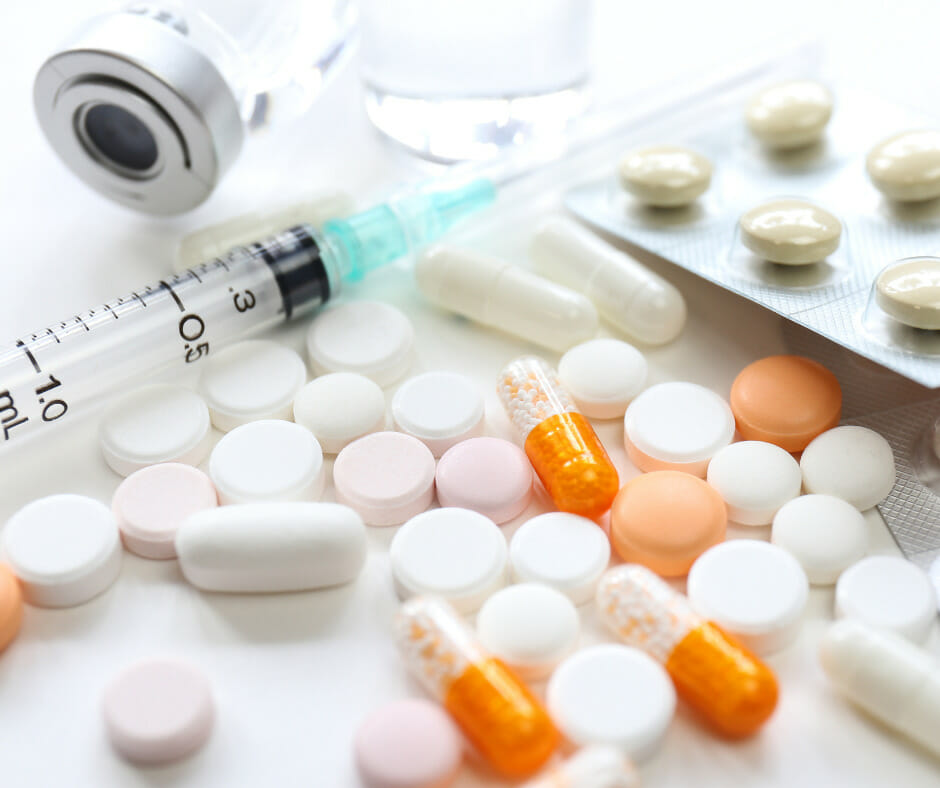Adderall is a prescription medication commonly used to treat attention deficit hyperactivity disorder (ADHD) and narcolepsy. It is a stimulant that works by affecting certain chemicals in the brain and nerves that contribute to hyperactivity and impulse control.
Understanding the appropriate dosage of Adderall is crucial for its effectiveness and safety. The typical dosage of Adderall varies based on individual needs and response to the medication. However, there is a question as to whether a low dosage, specifically 5mg of Adderall, is effective in managing the symptoms of ADHD.
Several factors can influence the efficacy of Adderall, such as the severity of the condition, individual tolerance, and body chemistry. While a low dosage may be effective for some individuals, it may not provide sufficient symptom relief for others. Additionally, the Adderall XR dosage may need to be adjusted based on clinical response and potential drug interactions.
Assessing the efficacy of a low dosage of Adderall involves considering the potential benefits it can provide. It may help improve focus, attention, and impulse control, leading to better academic or work performance. a low dosage may have fewer side effects compared to higher dosages.
Consulting with a healthcare professional is essential in determining the effectiveness of a low dosage of Adderall. They can evaluate individual needs, assess symptoms, and monitor the response to the medication. Monitoring symptoms and functioning over time, comparing the effects of a low dosage with higher dosages and placebo, can also help in assessing efficacy.
However, it is important to keep in mind that Adderall, even in low dosages, can have side effects and potential risks. Common side effects of Adderall include decreased appetite, insomnia, dry mouth, and increased heart rate. Before starting a low dosage, it is crucial to discuss medical history, potential interactions with other medications, and any concerns with a healthcare professional.
Determining the efficacy of a low dosage of Adderall requires careful evaluation and professional guidance. Every individual is different, and what works for one may not work for another. Therefore, personalized assessment and monitoring are vital to ensure optimal treatment outcomes and minimize potential risks.

Understanding the Dosage of Adderall
Understanding the dosage of Adderall is crucial for safe and effective use. Here are some important points to consider when it comes to understanding the dosage:
-
Dosage of Adderall is not a one-size-fits-all approach. It varies based on individual needs, medical conditions, age, weight, and the severity of symptoms. So, it’s important to consult with your healthcare provider to determine the right dosage for you.
-
It is generally recommended to start with a low dose and gradually increase it as needed. This allows the doctor to closely monitor your response and make necessary adjustments. Following this approach ensures that you find the optimal dosage with minimal side effects.
-
Each person’s response to Adderall may differ. Some individuals may experience relief with a lower dosage, while others may require a higher dose to achieve desired effects. Regular and open communication with your doctor is essential to assess the effectiveness of the dosage and make any necessary changes.
-
Keep in mind that higher doses of Adderall increase the risk of experiencing side effects. It is important to be aware of potential side effects and promptly inform your doctor if any occur. With your doctor’s guidance, adjustments to the dosage or exploration of alternative treatment options may be considered. When taking Adderall XR, be aware of potential risks and side effects such as seizures, serious heart problems, aggressive behavior, psychosis, and serotonin syndrome.
-
Overall, understanding the dosage of Adderall is a collaborative effort between you and your healthcare provider. It is crucial to maintain open and honest communication about your symptoms, treatment response, and any concerns you may have. This ensures that the dosage is tailored to meet your specific needs, making it both effective and safe.
By incorporating these key points and working closely with your healthcare provider, you can ensure that you have a thorough understanding of the dosage of Adderall and achieve the best possible outcomes.
What Is the Typical Dosage of Adderall?
Understanding the typical dosage of Adderall is crucial. The dosage varies based on factors like age, medical condition, and response. For children with ADHD, the usual starting dosage is 5mg once or twice a day. It can be increased gradually under supervision.
Similarly, adults with ADHD typically start with 5mg once or twice daily. Healthcare professionals can adjust the dosage based on individual needs and response. Other medical conditions, like narcolepsy, may require a different dosage.
Adderall XR is commonly used to treat ADHD in both children and adults. It is important to observe for potential side effects and try different medications within the same class before switching to another stimulant class.
Determining the right Adderall dosage requires professional guidance and careful consideration. Consult a healthcare professional to assess your needs and monitor your response. They can adjust the dosage and consider other factors as necessary.
Sarah, a parent, noticed improvements in her son’s ability to concentrate and manage ADHD symptoms with a low dosage of Adderall. With professional guidance, they gradually increased the dosage to find the optimal level. Sarah’s experience emphasizes the importance of working closely with healthcare professionals to determine the appropriate and effective dosage of Adderall.
Fact: According to the National Comorbidity Survey-Adolescent Supplement NCS-A, behavior disorders are the second most common mental disorders among the U.S. adolescents. Almost 19% of US Adolescents passed the diagnostic criteria4) for behavioral disorders.

What Is Considered a Low Dosage of Adderall?
A low dosage of Adderall, which is typically around 5mg, is considered for new users or those with less tolerance to stimulants. When determining the appropriate dosage, it is important to consult with a healthcare professional who will take into account factors like age, weight, and medical history.
The effectiveness of a low dosage of Adderall depends on how the individual responds to it, the severity of their symptoms, and any underlying conditions they may have. Monitoring symptoms and overall functioning is crucial in order to assess its effectiveness.
Although a low dosage may not be as potent as higher dosages, it can still be effective in treating conditions such as ADHD or narcolepsy. However, it is important to note that effectiveness may vary from person to person.
Regardless of the dosage, it is critical to consider the safety and precautions associated with Adderall. Common side effects include an increased heart rate, elevated blood pressure, and difficulty sleeping. It is important to discuss any pre-existing medical conditions, medications, or concerns with a healthcare professional before starting a low dosage of Adderall.
Studies have shown that a low dosage of Adderall can improve attention and reduce impulsivity in individuals with ADHD. However, it is essential to seek personalized advice and monitoring from a healthcare professional.
Is 5mg of Adderall Effective?
The effectiveness of 5mg of Adderall varies based on factors such as body chemistry, medical condition, and intended purpose. Is 5mg of Adderall effective? Generally, 5mg of Adderall is a low dosage prescribed to children or those with low tolerance to stimulant medications.
For people with ADHD, 5mg of Adderall can improve focus, concentration, and impulse control. It enhances cognitive function and reduces hyperactivity, helping manage symptoms.
However, effectiveness may vary between individuals. Some may require higher doses for desired effects. Close collaboration with a healthcare professional is crucial for determining dosage and monitoring effectiveness.
Considering effectiveness, it’s important to assess potential risks and side effects. Common side effects of Adderall include decreased appetite, trouble sleeping, and increased heart rate. These side effects are generally mild but should be monitored. Additionally, patients and healthcare providers should be aware of the potential psychiatric adverse reactions, such as the induction of a manic episode in patients with bipolar disorder or a family history of bipolar disorder, and the risk of treatment-emergent psychotic or manic symptoms in patients without a prior history of these conditions.
Fact: According to a study in the journal Neuropsychopharmacology, low doses of stimulants improve focus, attention, and executive function in both normal and ADHD subjects.
What Are the Factors That Affect the Efficacy of Adderall?
Several factors naturally impact the effectiveness of Adderall. These include:
- Dosage: The dosage of Adderall plays a significant role in determining its effectiveness. A higher dosage yields a stronger effect, while a lower dosage is less potent. It is crucial to find the right balance that suits individual needs and goals.
- Individual physiology: The way each person’s body reacts to medications varies. Factors such as metabolism, weight, and genetics can influence how Adderall affects an individual. Seeking advice from a healthcare professional is important in determining the appropriate dosage.
- Tolerance: Over time, the body might develop a tolerance to Adderall, reducing the effectiveness of a specific dosage. In such cases, a healthcare professional may make adjustments to the dosage or explore alternative treatment options.
- Co-existing conditions and medications: Adderall can interact with other medical conditions and medications, impacting its efficacy. It is essential to disclose all relevant medical information to a healthcare professional to ensure safe and effective usage. For instance, the use of monoamine oxidase inhibitors (MAOIs) should be avoided as they can lead to an excess of serotonin in the brain, causing potentially life-threatening symptoms.
- Compliance and adherence: Consistently following the prescribed dosage and schedule is crucial for maximizing the effectiveness of Adderall. Missing doses or inconsistent use can have an impact on its efficacy.
Fact: At some point in their lives, approximately 6.4 million American children aged 4 to 17 have been diagnosed with attention-deficit/hyperactivity disorder (ADHD).
What Are the Potential Benefits of a Low Dosage of Adderall?
The potential benefits of a low dosage of Adderall are numerous. They include improved focus and concentration, increased alertness and wakefulness, enhanced cognitive function, improved mood and motivation, and reduced impulsivity and hyperactivity in individuals with ADHD. These benefits can vary from person to person depending on their individual differences and specific medical conditions. It is crucial to consult with a healthcare professional to determine the appropriate dosage and discuss the potential benefits and risks of Adderall. Age, weight, and overall health should also be taken into consideration when evaluating the effectiveness of a low dosage of Adderall. Additionally, there is a risk of serotonin syndrome, a potentially life-threatening condition, which should be discussed with your healthcare provider.
For more information, read our article on what does Adderall do, to see hoe this medication works in your system and improve ADHD symptoms.

Can 5mg of Adderall Be Effective for Certain Conditions?
The effectiveness of Adderall can vary from person to person. Some individuals may find that 5mg provides the desired therapeutic effects, while others may require a higher dosage. The severity of the condition being treated also plays a role in determining the effectiveness of a low dosage of Adderall. For milder cases or individuals with a lower threshold for stimulant medications, 5mg may be sufficient.
Individuals who are more sensitive to the effects of Adderall may experience the desired benefits even at lower doses, which can be advantageous in minimizing potential side effects. However, it is important to assess the effectiveness of Adderall on an individual basis. Consulting with a healthcare professional is crucial in determining the appropriate dosage for specific conditions. They can evaluate the individual’s symptoms, medical history, and response to medication to determine if 5mg of Adderall is appropriate or if adjustments are needed.
Monitoring symptoms and functioning while taking a low dosage of Adderall is essential to assess its effectiveness over time. This can involve tracking improvements in attention, focus, and productivity, as well as any potential side effects. Comparisons with higher dosages and placebo can also help evaluate the efficacy of 5mg of Adderall for certain conditions.
Can 5mg of Adderall be effective for certain conditions? The effectiveness of Adderall can vary from person to person. Some individuals may find that 5mg provides the desired therapeutic effects, while others may require a higher dosage. The severity of the condition being treated also plays a role in determining the effectiveness of a low dosage of Adderall. For milder cases or individuals with a lower threshold for stimulant medications, 5mg may be sufficient.

How to Assess the Efficacy of Low Dosage Adderall?
Wondering how to determine the effectiveness of a low dosage of Adderall? Let’s dive right into it! We’ll explore different ways to assess the efficacy, including consulting with a healthcare professional, monitoring symptoms and functioning, and comparing the effects with higher dosages and a placebo. Get ready to uncover valuable insights and make informed decisions about the optimal dosage for your needs.
Consultation with a Healthcare Professional
When considering Adderall use, it is crucial to consult with a healthcare professional. Seeking advice from a healthcare professional ensures the safe and effective use of Adderall. They can provide valuable insights and expertise in determining the appropriate Adderall dosage for you. During a consultation, the healthcare professional will assess your medical history, symptoms, and individual needs to determine if Adderall is suitable for you. They will consider factors such as age, weight, and any pre-existing conditions that may affect the efficacy and safety of Adderall. Before prescribing Adderall, the healthcare professional will also evaluate potential drug interactions or contraindications. Additionally, they will discuss the potential benefits and risks of taking a low Adderall dosage and provide guidance on monitoring effectiveness and addressing side effects. It is important to maintain regular communication with your healthcare professional while taking Adderall to ensure optimal results and to address any necessary concerns or adjustments. However, remember that the healthcare professional’s information is specific to your circumstances and should not replace medical advice.
Monitoring of Symptoms and Functioning
Monitoring symptoms and functioning is vital when assessing the effectiveness of a low dosage of Adderall. Here are some important factors to consider:
1. Regular self-assessment: It is crucial to regularly monitor symptoms and functioning in order to track any changes or improvements. To facilitate this, keeping a journal or using a tracking app to record experiences can be beneficial.
2. Observation of symptoms: Paying close attention to the specific symptoms targeted with the use of Adderall is essential. Take note of any changes in the frequency, intensity, or duration of these symptoms.
3. Evaluation of daily functioning: Assessing how well daily tasks can be performed, including the ability to focus, concentrate, and fulfill responsibilities, is necessary. Notice any improvements or challenges in these areas.
4. Seeking feedback: Sharing observations with a healthcare professional is important for guidance and support. They can assist in interpreting changes in symptoms and functioning and make any necessary adjustments.
5. Considering external feedback: It is also valuable to take into account observations and feedback from friends, family, or coworkers who have noticed changes in behavior or abilities.
True story: Sarah, a college student, was prescribed a low dosage of Adderall to manage her attention deficit disorder (ADD). She diligently monitored her symptoms and functioning for several weeks. Sarah observed significant improvement in her ability to focus and complete assignments. She could stay on track during lectures and study sessions without feeling overwhelmed or distracted. Sarah also sought feedback from her professors, who noticed positive changes in her classroom engagement and performance. Based on her careful monitoring and external feedback, Sarah determined that the low dosage of Adderall effectively enhanced her attention and concentration abilities.
Focalin vs Adderall: which is better? To find answer to this question, read our article on the comparative analysis of Focalin and Adderall.

Safety and Precautions
Taking Adderall safely requires certain considerations. Here are some key points to keep in mind:
1. Consultation: Before starting or adjusting any medication, consult with a healthcare professional for guidance.
2. Dosage: Take Adderall exactly as prescribed and do not exceed the recommended dosage. High doses without medical supervision can lead to adverse effects
3. Other medications: Inform your healthcare provider about any other medications or supplements to avoid potential interactions. Some medications, like MAO inhibitors, can have serious interactions with Adderall.
4. Medical conditions: Individuals with pre-existing medical conditions, such as cardiovascular issues, high blood pressure, or a history of substance abuse, should exercise caution when taking Adderall. Discuss these conditions with your healthcare provider before starting the medication.
5. Side effects: Common side effects of Adderall include insomnia, loss of appetite, increased heart rate, and nervousness. If you experience severe or persistent side effects, contact your healthcare provider.
This is not an exhaustive list, so it’s important to follow the guidance of your healthcare professional. Every individual has unique medical circumstances, so personalized advice is crucial for safety and effectiveness.
True story: A friend of mine was prescribed Adderall for ADHD. She followed safety guidelines and regularly communicated with her doctor. However, she experienced heightened anxiety as a side effect. By discussing this with her doctor, they adjusted her dosage and found a solution that minimized her anxiety while managing her symptoms. This underscores the importance of open communication and close collaboration with healthcare professionals when taking Adderall.
What Are the Common Side Effects of Adderall?
When taking Adderall, it is crucial to be aware of its common side effects. Understanding these side effects will help you make an informed decision about whether Adderall is the right medication for you.
Common side effects of Adderall include:
- Increased heart rate: Adderall can raise your heart rate, leading to palpitations or a racing heartbeat.
- Insomnia: Difficulty falling asleep or staying asleep is a common side effect of Adderall, resulting in insomnia
- Dry mouth: Adderall can reduce saliva production, causing a dry mouth.
- Loss of appetite: Many individuals experience decreased appetite while taking Adderall, which can lead to weight loss.
- Headaches: Some people may experience headaches as a side effect of Adderall.
- Nervousness or anxiety: Adderall can sometimes increase feelings of nervousness or anxiety, especially at higher doses.
It’s important to note that the severity of these side effects may vary, and some individuals may not experience any side effects at all. If you do experience any of these side effects or any other unusual symptoms while taking Adderall, consult with your healthcare professional.
“Adverse effects listed in drug labels of prescription amphetamines include disturbances of mood and behavior in addition to cardiac and gastrointestinal effects. Most of these adverse events are considered “time-limited”, resolving rapidly after discontinuation of stimulant exposure.” (Potential Adverse Effects of Amphetamine Treatment on Brain and Behavior: A Review, Berman et al., 2009)
Keep in mind that everyone reacts differently to medications, so what works for one person may not work for another. Your healthcare professional can offer guidance on whether the benefits of taking Adderall outweigh the potential side effects.
Before starting a low dosage of Adderall, have a discussion with your healthcare professional about the potential side effects and any precautions you should take. They can provide personalized advice based on your medical history and current health condition.
Disclaimer: The information provided here is for informational purposes only and should not be considered medical advice. Consult with your healthcare professional for personalized guidance regarding Adderall.
What Should You Consider Before Starting a Low Dosage of Adderall?
Before starting a low dosage of Adderall, there are several factors you should consider. First and foremost, it is crucial to consult a healthcare professional. Speaking with a healthcare professional before initiating any medication, such as Adderall, is essential. They will be able to provide guidance on the appropriate dosage based on your specific condition and medical history.
Additionally, it is important to monitor your symptoms and functioning when taking a low dosage of Adderall. Keeping track of how you are feeling and how well the medication is working will help determine if any adjustments to the dosage or treatment plan are necessary.
Comparing the effects of the low dosage with higher dosages or a placebo can also be beneficial. This comparison can provide valuable insights into the optimal dosage for your individual needs. Understanding the potential side effects and risks associated with Adderall is another crucial consideration. It is important to be aware of common side effects such as increased heart rate, decreased appetite, and difficulty sleeping. Moreover, if you have any pre-existing medical conditions or are taking other medications, it is crucial to be aware of any potential interactions with Adderall.
Considering all of these factors and seeking guidance from a healthcare professional will ensure a safe and effective experience when starting a low dosage of Adderall.
Frequently Asked Questions
Question: What is the recommended initial dosage of Adderall XR for children with ADHD?
Answer: For children aged 6-12 years, the recommended starting dose of Adderall XR is 10 mg once daily in the morning. The dosage may be adjusted in increments of 5 mg or 10 mg at weekly intervals. The maximum recommended dose for children in this age group is 30 mg/day.
Question: Are there any considerations for dosing Adderall XR in adults with ADHD?
Answer: In adults with ADHD, the recommended starting dose is 20 mg/day. However, dosage should be individualized based on the patient’s needs and response to the medication. Factors such as history of taking stimulant medications, genetic differences, and co-existing conditions may affect how a patient responds to a prescribed dose.
Question: What is the recommended dose of Adderall XR for adults with severe renal impairment?
Answer: In adults with severe renal impairment, the recommended dose of Adderall XR is 15 mg once daily in the morning.
Is there a risk of dependence when using Adderall XR?
Yes, there is a potential risk of dependence with Adderall XR. As a stimulant medication that contains amphetamine and dextroamphetamine, prolonged and improper use may lead to physical or psychological dependence. However, regular monitoring and open communication with your healthcare professional at an outpatient rehab clinic are essential to manage the risks associated with Adderall XR use.
Question: How should Adderall XR capsules be taken?
Answer: Adderall XR capsules can be taken whole or opened and sprinkled on applesauce. If the sprinkle method is used, the applesauce should be consumed immediately and not stored. The entire contents of the capsule should be taken without chewing.
Question: Does Adderall XR have a duration of action throughout the day?
Answer: Adderall XR is an extended-release formulation that is designed to provide clinical efficacy throughout the day. It contains immediate-release and delayed-release beads to mimic the effects of two doses of immediate-release Adderall given 4 hours apart.









